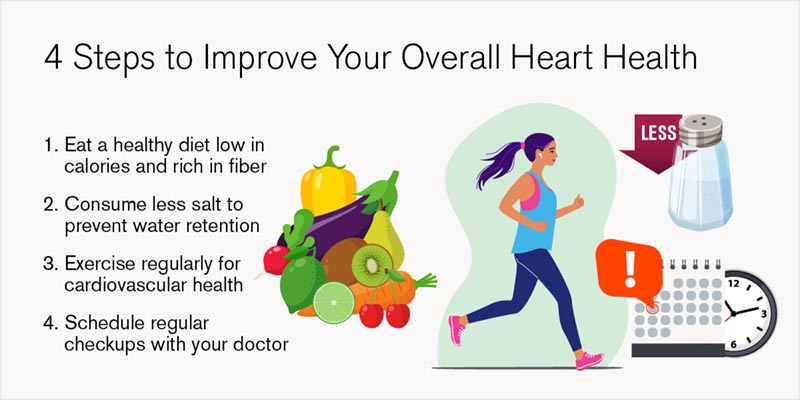Heart Failure Treatments
October 21, 2024Heart failure can be a confusing diagnosis. You might think it means that your heart is about to give up.
Heart failure is actually a broad term that means your heart isn’t working as well as it should. It ranges from a mild condition to a more advanced form of the disease.
Early treatment is essential and can help you live longer and have a better quality of life. Loyola heart failure and transplant cardiologist, M. Dennis Yu, MD, answers critical questions about this complex disease and provides important insight into heart failure treatments.
Can lifestyle modifications reduce heart failure?
Your heart is a pump that contracts vigorously to send blood to all parts of your body. In heart failure, your heart isn’t pumping properly. Pumping irregularities can lead to a buildup of fluid in your blood vessels and tissues.
Changes to your diet can reduce the amount of fluid that accumulates. The most important things you can do are reduce the amount of salt you consume and limit your intake of liquids.
You can also improve your heart health by making healthy lifestyle choices that help control your weight and manage other health conditions, such as high blood pressure, high cholesterol and diabetes.

What types of medications treat heart failure?
Medications can help you feel better and make your heart stronger. At Loyola, we have extensive experience in managing complex medication treatments.
The four main types of heart failure medications include:
- Angiotensin receptor-neprilysin inhibitors, which lower blood pressure and reduce long term stress on the heart
- Beta blockers, which slow heart rate and reduce long term stress on the heart
- Mineralocorticoid receptor antagonists, which reduce long term stress on the heart
- Sodium-glucose cotransporter 2 (SGLT-2) inhibitors, which are a new class of medications that improve heart failure
What heart conditions are related to heart failure and how are they treated?
Heart failure is often related to other types of heart conditions that limit the heart’s ability to pump blood efficiently, including:
- Arrhythmias, which include irregular or abnormally fast or slow heartbeats
- Cardiomyopathy, where the heart becomes enlarged, weakened or stiff
- Congenital heart defects that develop before birth
- Coronary artery disease, which are blockages in the arteries that supply blood to the heart
- Valvular disease, which occurs when the heart valves become tight or leaky
At Loyola, we offer comprehensive care to treat different causes of heart failure. These include:
- Complex Coronary stenting and coronary artery bypass
- Catheter-based heart valve repair and surgical replacement
- Pacemakers and implantable cardioverter defibrillators to protect the heart from abnormal rhythms
- Ablations
- Preventive care
- Dietary and lifestyle education
What are advanced heart failure treatments?
Despite therapy, patients with heart failure may continue to progress and have advanced symptoms. In these late stages, the heart eventually becomes unable to pump on its own. Advanced heart failure therapies include:
- Left ventricular assist device (LVAD): an LVAD is a surgically implanted pump that takes over the pumping action of your left ventricle — the main pumping chamber of your heart. You wear a battery pack that powers the LVAD
- Heart transplant: In this procedure, the surgeon replaces your heart with one from a deceased donor.
- Cardiac palliative care: In some cases, a person is not eligible for an LVAD or heart transplant or decides to forego these treatments. Loyola doctors provide personalized care to help manage symptoms and avoid hospitalizations.
How do doctors develop a heart failure treatment strategy?
Heart failure treatment depends on what is causing it. As heart failure specialists, we work like detectives to pinpoint the underlying cause and assess heart function.
Our specialists develop a customized treatment plan based the results of comprehensive testing:
- Blood testing
- Cardiac imaging, such as cardiac CT, cardiac MRI, echocardiogram and rhythm evaluation
- Rhythm evaluation with electrocardiograms, mobile telemetry, take home heart monitors, electrophysiologic studies
- Cardiopulmonary stress tests to evaluate how your heart and lungs function with exercise
- Catheter-based testing to look for blockages and structural problems and measure heart and lung function
Why choose Loyola for heart failure treatment?
Built on a tradition of excellence and innovation, Loyola Medicine's comprehensive heart and vascular program brings together specialists from all aspects of cardiology and vascular care.
Our specialists treat a wide variety of cardiac and vascular conditions and diseases while offering nationally acclaimed comprehensive heart and vascular services. These heart failure specialists have extensive experience treating this complex condition. We offer world-class care for people with all stages of heart failure.
To make an appointment today, call 888-584-7888 or schedule an appointment online.
M. Dennis Yu, MD is a heart failure and transplant cardiologist at Loyola Medicine. He specializes in advanced heart failure and provides care at the end stage of cardiac disease, including heart transplant. His research interests include improving heart transplant outcomes and cardiac issues related to COVID-19.
Dr. Yu received his medical degree from the University of Virginia Medical School. He completed his residency at University of Wisconsin Hospital and Clinics and fellowship at Loyola University Stritch School of Medicine.
Book an appointment today to see Dr. Yu or another Loyola specialist by self-scheduling an in-person or virtual appointment using myLoyola.


